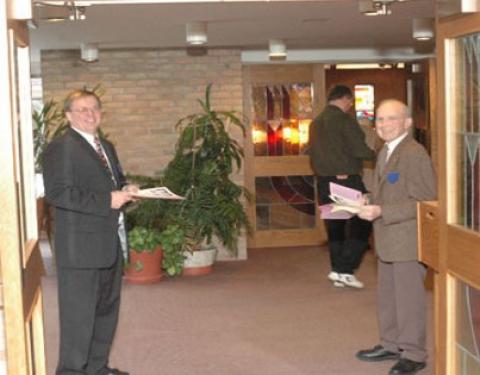
What to Expect - Before Mass
More late arrivals than usual
Be patient and maintain a welcoming spirit.
More traffic / vans than usual
Use traffic cones to designate areas where cars and vans can pull over close to the church entrance to unload passengers. Schedule an usher/greeter to welcome and assist these guests.
Groups of guests with disabilities arriving from group homes or organizations
Expect greeting and seating to take additional time.
Schedule an additional usher (or recruit a friendly Mass-goer) to assist.
Requests for gluten-free Hosts, assistive listening devices, worship aids, special or ASL seating, other accommodations.
Develop a plan with your pastor for providing the accommodations you offer (especially a Communion procedure for those who need a low-gluten Host). Train Eucharistic Ministers and ushers in this plan so they can provide everything and direct people smoothly. Consider a Reserved Seating section up front if your attendance warrants it.
A tendency for persons with disabilities to sit in the back pew of the church or off to the side (“out of the way”).
Invite/encourage these guests to sit up front. Escort those who wish to do so. Don’t press; some may prefer to stay in the back or near a bathroom or exit. But others may simply need the invitation to sit up front. Sitting up front will enhance their connection to the Mass and to the rest of the congregation. It may also help with Communion.
What to Expect - During Mass
More coming and going; more breaks; wandering; leaving early.
Be patient and maintain a welcoming spirit. Some guests are just beginning to learn how to attend Mass and are not yet able to participate. Sensory differences, attention deficit, and other issues can make it difficult for someone to sit through a whole Mass.
Delayed or no response (to a greeting, to putting money in the collection basket, to lining up for Communion, etc.)
Give more time to respond. A person with a disability may take 10 or more seconds to respond to cues. If they do not respond to a greeting or let go of the money to put in the basket, let it go. With time and repetition, their participation should increase.
More noise (calling out, speaking loudly)
Be patient and kind. Focus on the blessing of the guest’s presence. Ignore the sound if it is behind you or across church. If the person is very near you, a reassuring smile to the parent or caregiver may be appreciated.
More movement (flapping, tapping, stomping, etc.)
See above. These are sensory-seeking behaviors that persons with disabilities may engage in for self-regulation. Allow parents or caregivers to address any behaviors.
Special circumstances at Communion
Plan the Communion procedure with your pastor, keeping in mind both those worshippers who line up as usual and those who need to be served in their pew. It is helpful to designate one Eucharistic Minister to “float” throughout the church (with an usher’s guidance) and serve individuals in their pews. If a Eucharistic Minister is uncertain about whether an individual wishes to receive Communion and/or is physically capable of consuming a Host, ask the parent or caregiver. Some individuals may not be able to consume an entire Host. Eucharistic Ministers who float may need additional training.
What to Expect – After Mass
Slower departures
Take the opportunity to meet/greet guests (there may not have been time before Mass to do so) and thank them for attending. Assist people as needed to cars/vans.
In general:
- Any unexpected situation can be handled with kindness, patience and courtesy.
- Every parish will have different worshippers, needs, challenges and opportunities.
- Treat any unexpected needs or problems as lessons for future improvement.
Source: St. John Chrysostom Parish
Office for Persons with Disabilities
Archdiocese of Philadelphia
